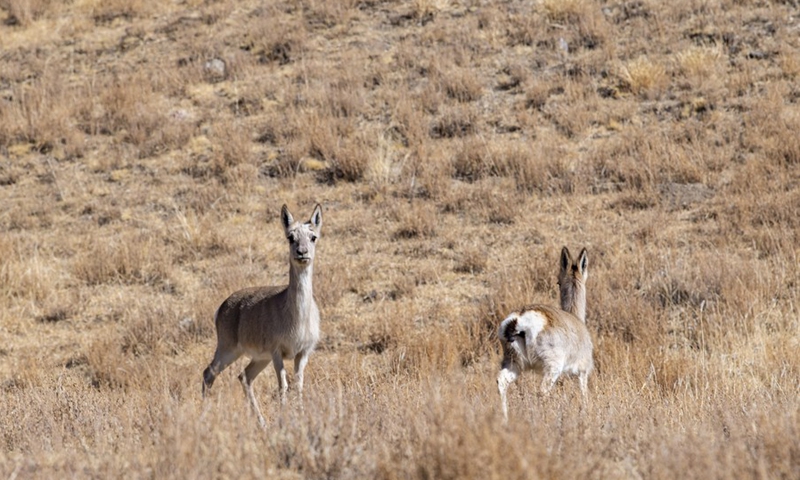Political advisor suggested conducting pathogen investigations on wild animals nationwide, as preparation for future epidemics

Photo taken on Jan. 10, 2021 shows Tibetan gazelles by the Yamzbog Yumco Lake in Shannan, southwest China's Tibet Autonomous Region. The population of wild animals that inhabit and breed by the lake increased year by year thanks to efforts of environmental protection.(Photo: Xinhua)
China’s political advisor suggested the country coordinate a pathogen investigation of wild animals nationwide, and develop test kits, as well as medicines if any highly transmissible and pathogenic pathogens are to be found; as a preparation for future epidemic diseases.
Endemic and pandemics already seen in the 21 century, such as SARS, bird flu and COVID-19 have hugely damaged our society, and cross-border, cross-species transmission are the major reasons for causing most infectious diseases, said Zhang Kuanshou, a member of the 14th National Committee of the Chinese People's Political Consultative Conference (CPPCC).
It is on this basis that Zhang proposed expanding nationwide investigations into pathogens present in wild animals, and evaluate the risk of spilling over into humans. Zhang said China previously has data on host and medium of infectious diseases such as plague and malaria. But a complete data map of wild animal’s carrying pathogens does not exist at the national level.
He proposed government authorities, along with universities and institutes to join related investigations, and to label certain animal as key prevention objects based on research results.
Zhang also urged the establishment of a testing system and develop treatment if any highly transmissible, pathogenic pathogens are to be found. He called for the forestry bureau to keep monitoring wild animals, especially those sick and dead, and report test results to relevant authorities.
The political advisor said it is important to build database of pathogens present in wild animals, and institutes with necessary resources can expand research on medicine and vaccines beforehand based on high-risk pathogens that are identified.
Liang Wannian, team leader of the Chinese side of the joint expert team of WHO-convened Global Study of Origins of COVID-19 said in 2021 that during January and February 2021, the WHO-China joint expert team, while studying the origins of the virus, put forward four different possible or potential pathways for the introduction of the virus, including the introduction through wild animals and an intermediate host to humans from a natural host.
Liang said they had conducted virus antibody or nucleic acid testing for more than 38,000 livestock and poultry samples, and more than 41,000 samples of wild animals collected from 31 provincial-level regions across the country from 2018 to 2020, no positive results have been found to date.
Studies on origins of COVID-19 in animals should be the focus of next phase of research, according to Liang. He said the study should not only be limited on wild animals such as bats, but also related animals, such as pangolins, civets, minks and more. It is valuable to study the possible origins and distribution of these intermediate hosts, which have been proved able to carry or possibly carry pathogens through research carried out by scientists across a number of countries.
Global Times

